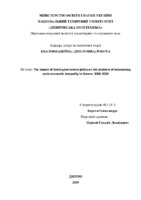Показати скорочений опис матеріалу
The impact of Greek government policy on the problem of overcoming socio-economic inequality in Greece: 2008-2020
| dc.contributor.author | Корота, Олександр | |
| dc.date.accessioned | 2022-07-21T11:33:12Z | |
| dc.date.available | 2022-07-21T11:33:12Z | |
| dc.date.issued | 2022-06-22 | |
| dc.identifier.citation | Korota O. The impact of Greek government policy on the problem of overcoming socio-economic inequality in Greece: 2008-2020 // Bachelor paper. - Dnipro, 2022 | uk_UA |
| dc.identifier.uri | http://ir.nmu.org.ua/handle/123456789/161322 | |
| dc.description.abstract | At the center of this work is directly the problem of socio-economic inequality, which I examined on the example of a single country and which at the same time is a member of the European Union, namely Greece. In it, this problem is widely developed, but at the same time it is not the worst among the same European countries. It is this fact that gives us the opportunity for a qualitative comparison of Greece with other actors on the same continent with more objective indicators and understanding of the situation as a whole. To begin with, it is worth understanding the nature and the very term of socio- economic inequality (consider its history of research and origin, types, as well as its causes and impact on society), as well as directly determine the very indicators by which this inequality will be assessed, and by which it is possible to determine the dynamics of changes, which will later serve as a guide for finding and considering the reforms of the Greek government, for their further evaluation. At the second stage, the performance of Greece will be compared with countries such as Bulgaria and Finland, in the first, the problems of socio-economic inequality and economic problems are more pronounced, while, on the contrary, it is a representative of one of the highest standards of living and well-being in the European Union and in the world. It is this contrast that should give that more in- depth understanding of the situation, which was mentioned above. Therefore, all indicators will be found and discussed in the first part of the bachelor's work using the theoretical basis and the works of the classics, smoothly moving into the realities of our time. And finally, in the third final part, using the official documents of the government and the membership of organizations of which the state under study (Greece) is, this part will also introduce additional indicators as needed, but its main goal will be to track the success and, accordingly, the subsequent assessment of 4 structural reforms, one-time promotions, programs, etc. The theory and indicators studied in the previous parts will serve as a guideline for this. Greece was not chosen by chance, as it is the country that almost suffered the most from the financial and economic crisis in 2008, which could not but affect the standard of living and well-being within the state, which is related to the problem I am studying. But still, most of the reforms described in the work were aimed at overcoming the consequences of the crisis, and soon the Covid-19 pandemic. But since these things are completely interconnected (this fact will be consistently confirmed throughout the campaign), it will be remarkably interesting to track their direct impact on the change in the indicators of socio-economic inequality in Greece. | uk_UA |
| dc.language.iso | en | uk_UA |
| dc.subject | The impact of Greek government policy on the problem of overcoming socio-economic inequality in Greece: 2008-2020. Inequality, Greece, politics | uk_UA |
| dc.title | The impact of Greek government policy on the problem of overcoming socio-economic inequality in Greece: 2008-2020 | uk_UA |
| dc.type | Other | uk_UA |

